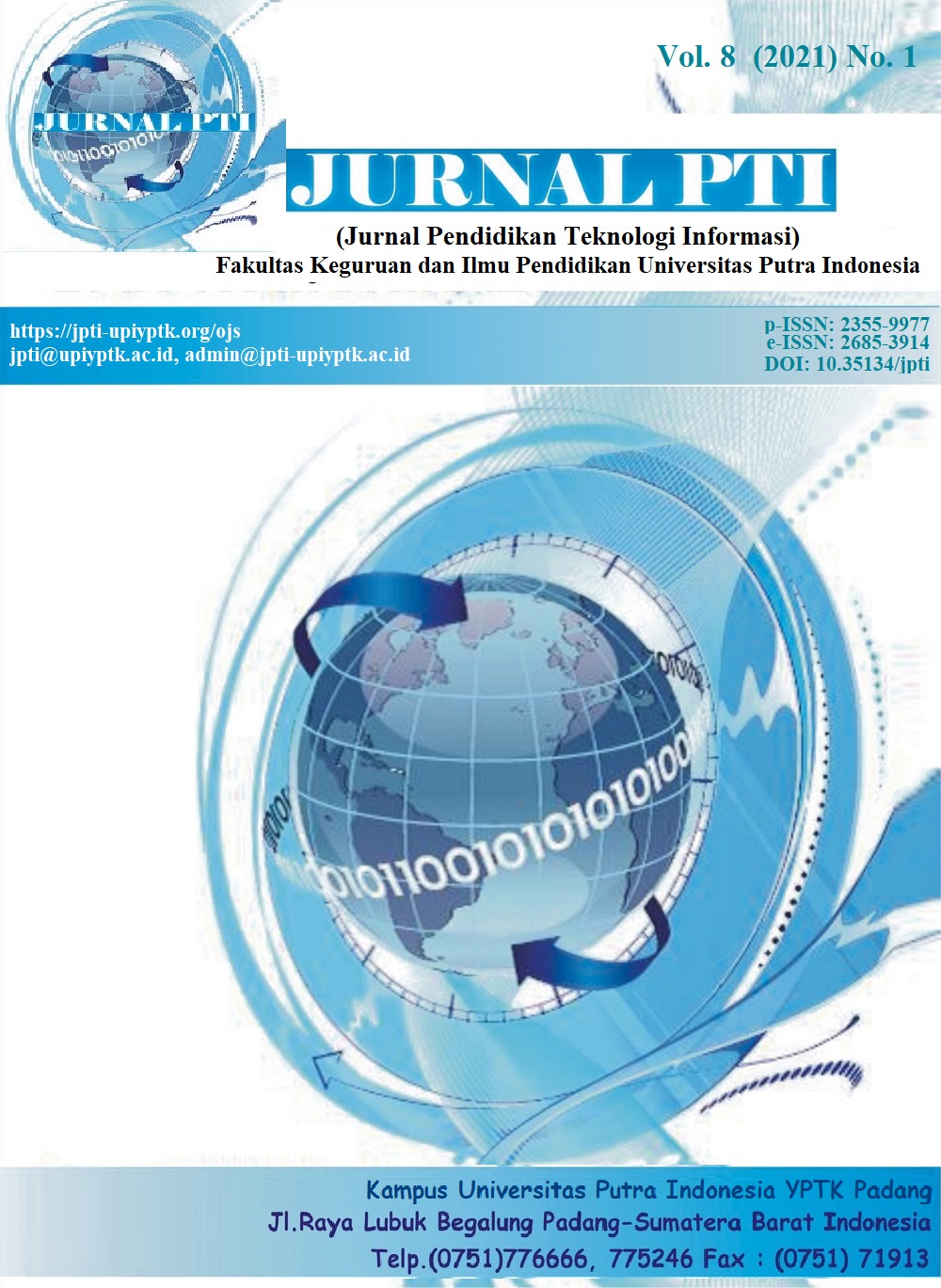Evaluation of the Entrepreneurial Printing School Program at SMKN 1 Tanjung Pinang Using CIPP Models
DOI:
https://doi.org/10.35134/jpti.v10i1.156Keywords:
Entrepreneurial Printing School, CIPP Evaluation Model, Entrepreneurship Program, SMK, SPWAbstract
The purpose of this study was to analyze the implementation of the entrepreneurial school program from the aspect of evaluating context, input, process, and product (CIPP) with the existence of an entrepreneurial school program to support entrepreneurship subjects in vocational schools. The CIPP evaluation model is one type of model that can analyze the success rate of implementing the Entrepreneurial Printing School (SPW) program. The results of the evaluation analysis that have been carried out state that the SPW program at SMK Negeri 1 Tanjung Pinang based on the context aspect has a conducive environment to make the school a driving force for entrepreneurship, with the existence of creative products for students and teachers, has a business management department and a marketing department both retail and online. input from this program students starting from class X in various majors have been prepared to have an entrepreneurial spirit by making captains and danru in each class to carry out entrepreneurship programs and to support entrepreneurship subjects, teachers who teach entrepreneurship subjects are teachers who on average have businesses and have an entrepreneurial background and have good infrastructure, the process aspects of the activities are carried out in accordance with the guidebook that has been determined by the Directorate of Vocational Development (PSMK) and is carried out well, the product aspects are (1) Formation of the SPW team; (2) Socialization of the SPW program in the school environment; (3) SPW program product exhibition activities; (4) Fostering entrepreneurial activities; (5) Increasing student competence in digital marketing; (6) The creation of student entrepreneurial activities independently; and (7) Evaluation of the SPW continuation program.
References
Julita Sembiring, Lidya. 2022. Pengangguran Terbanyak RI Ternyata Lulusan SMK. CNBC Indonesia. https://www.cnbcindonesia.com/news/20220509143648-4-337485/pengangguran-terbanyak-ri-ternyata-lulusan-smk.
Darmiyati dkk. 2017. Pengembangan Modul Prakarya dan Kewirausahaan Berorientasi Pembelajaran Kontekstual Untuk Siswa SMA. Jurnal Studi Sosial. 5(3). pp.1-18.
Biro Komunikasi. 2018. Kemendikbud Dorong SMK Ciptakan Wirausaha Muda. Kemdikbud. https://www.kemdikbud.go.id/main/blog/2018/06/kemendikbud-dorong-smk-ciptakan-wirausaha-muda
Barliana, L. 2019. Vistra Mewujudkan Sekolah Pencetak Wirausaha Negeri Atas Awan di SMK Negeri 1 Blado. Media Penelitian Pendidikan: Jurnal Penelitian dalam Bidang Pendidikan dan Pengajaran, 13(2), pp. 149-156. https://doi.org/10.26877/mpp.v13i2.5097.
Munawaroh, S. F. 2019. Analysis Program Sekolah Pencetak Wirausaha (SPW) Terhadap Skill Berwirausaha Siswa SMK Negeri 7 (STM Pembangunan) Semarang (Doctoral dissertation, Universitas Negeri Semarang).
Samsudi, Joko Widodo, dkk. 2016. Strategi Kemitraan SMK dengan Stakeholders dalam Pengembangan Kewirausahaan Lulusan. Jurnal Penelitian Pendidikan. 33(2). Pp.175-180. https://doi.org/10.15294/jpp.v33i2.9102
Riswanto, A. 2016. Pendampingan Kreativitas Dan Kemandirian: Pendidikan Calon Wirausahawan Muda. Edusentris, 3(3), pp.300-305.
Carnawi dkk. 2017. Application of Project Based Learning (PBL) Model for Materials of Salt Hydrolysis to Encourage Students'Entrepreneurship Behaviour. International Journal of Active Learning. 2(1). pp.50-58.
Junaidah, J., Ambiyar, A., Jalinus, N. ., Waskito, W., & Wulansari, E. (2023). Evaluasi Assesment Diagnostik dalam Merencanakan Model Pembelajaran Berdiferensi di SMK Negeri 2 Karimun. Jurnal PTI (Pendidikan dan Teknologi Informasi) Fakultas Keguruan Ilmu Pendidikan Universitas Putra Indonesia Padang, 10(1), 48–54. https://doi.org/10.35134/jpti.v10i1.147
Halimah, R. U. S., & Hadjar, I. 2018. Arabic language learning evaluation in higher education with context input process product (CIPP) model. ALSINATUNA, 4(1). pp.33-48. https://doi.org/10.28918/alsinatuna.v4i1.1591
Darma, I. K. 2019. The effectiveness of the teaching program of the CIPP evaluation model. International Research Journal of Engineering, IT & Scientific Research. 5(3). pp.1-13.
Mulyana, Deddy & Solatun. (2013). Metode Penelitian Komunikasi: contoh-contoh penelitian kualitatif dengan pendekatan praktis. Cetakan ke-3. Bandung: PT Remaja Rosdakarya.
Rohman, M. and Sutadji, E. 2018. The concept of evaluating the implementation of Honda classes in vocational schools using the CIPP Model. Taman Vokasi, 6(2), pp.142-146.
Arikunto, Suharsimi. 2012. Prosedur Penelitian Suatu Pendekatan Praktek. Jakarta: Rineka Cipta.
Arikunto, Suharsimi. 2007. Evaluasi Program Pendidikan. Jakarta: Bumi Aksara.
Birul Walidaini, Arum dan Winarno, Agung. 2017. Vocational High School Students Entrepreneurship: The Success of Family or School Education. Jurnal Pendidikan Bisnis dan Manajemen. 3(1), pp. 1-11. http://dx.doi.org/10.17977/um003v3i12017p001
Badrujaman, A. 2011. Teori dan Aplikasi Evaluasi Program Bimbingan Konseling. Jakarta: PT Indeks.
Mahmudi, Ihwan. 2011. CIPP: Suatu Model Evaluasi Program Pendidikan. Jurnal At- Ta’dib. 6(1). pp.111-125.
Sanjaya, Wina. 2011. Penelitian Tindakan Kelas. Jakarta: Kencana Prenada Media Grup.
Mahendra, I. G. B., & Wiyono, G. 2020. Evaluation on implementation of quality management system in vocational high schools with CIPP approach. In Journal of Physics: Conference Series. 1446(1) pp. 012057. https://doi.org/10.1088/1742-6596/1446/1/012057
Eryanto, H., Swaramarinda, D. R., & Nurmalasari, D. 2019. Effectiveness of entrepreneurship practice program: Using CIPP program evaluation. Journal of Entrepreneurship Education. 22(1). pp.1-10.
Kavgaoglu, D., & Alci, B. 2016. Application of Context Input Process and Product Model in Curriculum Evaluation: Case Study of a Call Centre. Educational Research and Reviews.11(17). pp.1659-1669.
Sidik, M., Tunas, B., & Entang, M. 2017. Evaluation of Industrial Work Practice Program Competence of Motorcycle.
Downloads
Published
How to Cite
Issue
Section
License
Copyright (c) 2023 JURNAL PTI (PENDIDIKAN DAN TEKNOLOGI INFORMASI) FAKULTAS KEGURUAN ILMU PENDIDIKAN UNIVERSITA PUTRA INDONESIA "YPTK" PADANG

This work is licensed under a Creative Commons Attribution 4.0 International License.





